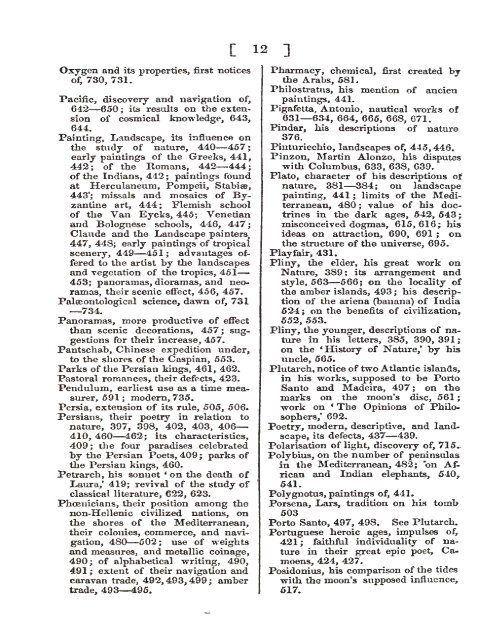COSMOS, VOL. II - World eBook Library
COSMOS, VOL. II - World eBook Library
COSMOS, VOL. II - World eBook Library
You also want an ePaper? Increase the reach of your titles
YUMPU automatically turns print PDFs into web optimized ePapers that Google loves.
Oxygen and its properties,<br />
first notices<br />
of, 730, 731.<br />
Pacific, discovery and navigation of,<br />
642 650 ; its results on the extension<br />
of cosmical knowledge, 643,<br />
644.<br />
Painting, Landscape,<br />
its influence on<br />
the study of nature, 440 457;<br />
early paintings of the Greeks, 441,<br />
442; of the Romans, 442444;<br />
of the Indians, 442 ; paintings (bund<br />
at Herculaneum, Pompeii, Stabise,<br />
443'; missals and mosaics of Byzantine<br />
art, 444; Flemish school<br />
of the Van Eycks, 445; Venetian<br />
and Bolognese schools, 446, 447;<br />
Claude and the Landscape painters,<br />
447, 448; early paintings of tropical<br />
scenery, 449 451; advantages offered<br />
to the artist hy the landscapes<br />
and vegetation of the tropics, 451<br />
453; panoramas, dioramas, and neoramas,<br />
their scenic efl'ect, 456, 457.<br />
Palseontological science, dawn of, 731<br />
734.<br />
Panoramas, more productive of effect<br />
than scenic decorations, 457; suggestions<br />
for their increase, 457.<br />
Pantschab, Chinese expedition under,<br />
to the shores of the Caspian, 553.<br />
Parks of the Persian kings, 461, 462.<br />
Pastoral romances, their defects, 423.<br />
Pendulum, earliest use as a tune measurer,<br />
591 ; modern, 735.<br />
Persia, extension of its rule, 505, 506.<br />
in relation to<br />
Persians, their poetry<br />
nature, 397, 398, 402, 403, 406<br />
410, 460 462; its characteristics,<br />
409; the four paradises celebrated<br />
by the Persian Poets, 409; parks of<br />
the Persian kings, 460.<br />
Petrarch, his sonnet ' on the death of<br />
Laura,' 419; revival of the study of<br />
classical literature, 622, 623.<br />
Phoenicians, their position among the<br />
non-Hellenic civilized nations, on<br />
the shores of the Mediterranean,<br />
their colonies, commerce, and navi-<br />
gation, 480 502; use of and measures, and metallic<br />
weights<br />
coinage,<br />
490; of alphabetical writing, 490,<br />
491 ;<br />
extent of their navigation and<br />
caravan trade, 492,493,499; amber<br />
trade, 493495.<br />
Pharmacy, chemical, first created by<br />
the Arabs, 581 .<br />
Philostratus, his mention of ancien<br />
paintings, 441.<br />
Pigafetta, Antonio, nautical works of<br />
631634, 664, 665, 668, 671.<br />
Pindar, his descriptions of nature<br />
376.<br />
Pinturicchio, landscapes of, 445,446.<br />
Pinzon, Martin Alonzo, his disputes<br />
with Columbus, 633, 638, 639.<br />
Plato, character of his descriptions of<br />
nature, 381 384; on landscape<br />
painting, 441 ; limits of the Mediterranean,<br />
480; value of his doctrines<br />
in the dark ages, 542, 543 ;<br />
misconceived dogmas, 615,616; his<br />
ideas on attraction, 690, 691 ; on<br />
the structure of the universe, 695.<br />
Playfair, 431.<br />
Pliny, the elder, his great work on<br />
Nature, 389; its arrangement and<br />
style, 563 566; on the locality of<br />
the amber islands, 493 ; his description<br />
of the ariena (banana) of India<br />
524; on the benefits of civilization,<br />
552, 553.<br />
Pliny, the younger, descriptions<br />
of na-<br />
ture in his letters, 385, 390, 391 ;<br />
on the 'History of Nature,' by his<br />
uucle, 565.<br />
Plutarch, notice of two Atlantic islands,<br />
in his<br />
Santo<br />
works, supposed to be Porto<br />
and Madeira, 497; on the<br />
marks on<br />
work on<br />
the moon's disc, 561 ;<br />
' The Opinions of Philosophers,'<br />
692.<br />
Poetry, modern, descriptive, and landscape,<br />
its delects, 437 439.<br />
Polarisation of light, discovery of, 715.<br />
Polybius, on the number of peninsulas<br />
in the Mediterranean, 482; "on African<br />
and Indian elephants, 540,<br />
541.<br />
Polygnotus, paintings of, 441.<br />
tradition on his tomb<br />
Porsena, Lars,<br />
503<br />
Porto Santo, 497, 498. See Plutarch.<br />
Portuguese heroic ages, impulses of,<br />
421; faithful individuality of nature<br />
in their great epic poet, Ca-<br />
moens, 424, 427.<br />
Posidonius, his comparison of the titles<br />
with the moon's supposed influence,<br />
617.

















